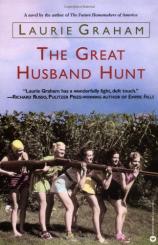Reading Group Guide
Discussion Questions
The Great Husband Hunt

1. The book opens with a genealogy, "Poppy Minkel and the British Royal Family." Besides the humor of this tenuous connection, what is the point of including it? Does it relate to Mortie's statement: "A person who knows where he came from need never feel lost. Roots are a blessing. If you know where you came from you know who you are and you can decide where you're going" (p. 330)?
2. Poppy is the narrator and the central character-and what a character she is. What about her is particularly outrageous? Do you feel she is naïve, or is that a pose? What do you think about her rejection of her daughters? Her lack of recognition of the German threat? Her belief that money can fix anything? What is it that you think she needs above all else?
3. Are all the women characters in this book focused on "The Great Husband Hunt"? Is marriage a recipe for happiness for the women in this book? Emerald says, "Mom, I have a life. The best kind" (p. 306). Does she truly have "the best kind"? Is it the best kind for every woman?
4. We have a number of women characters being left without their fathers in this novel. What impact do you feel the loss of a father has on each of them? Do you feel their reactions are authentic and true in your experience?
5. The twentieth century is viewed through Poppy's particular point of view. How would you describe her "voice"? What colors the way she perceives events? Choose another character and discuss how he or she might have seen an event. You might want to consider a classic philosophical question: Is there an objective "reality" that is true and universal, or is reality a slippery concept, wholly dependent on the viewer?
6. Poppy says of her daughter Sapphy: "It wasn't me who ruined her life, of course." But did she? If not, what contributed to Sapphy's fate? What do you think the author is saying about free will? Do we make our life choices, or are our choices made for us?
7. The great mythologist Joseph Campbell calls Judaism an "ethnic religion." He contrasts it with Christianity by pointing out that one must be born a Jew to be a Jew, whereas anyone can become a Christian by adopting Christianity's beliefs. Popppy and her family are non-practicing Jews; in fact, they try to escape their Jewishness. What steps do they take to assimilate into American culture and lose their ethnicity? Are they successful? Can one stop being a Jew by renouncing Judaism? What about other ethnic groups such as Italians, or, as depicted in this book, "The Irish"?
8. The "outsiders" from mainstream culture in this book include homosexuals. Who are the homosexual characters? Is Reggie gay? How is this outsider status depicted? Why do you think these characters play such a big part in Poppy's life?
9. Art, artists, and the art world also have a major role in Poppy's life. She particularly champions avant garde artists. Is the author poking fun at art created from macaroni or pubic hair? At trend-setting galleries? Or is Laurie Graham, by making Poppy its champion, indicating that this art is legitimate? What does "innovative" art contribute to society? What does it say about it?
10. Is Poppy a woman ahead of her time? Contrast her with Vera Farber, Sherman's wife. The book also touches on the rise of the women's movement. Who would you say is more a feminist, Poppy or Vera?
11. Overall, do you think the book advocates that a person's background and family are factors to be escaped from or embraced? Can they be oppressive and harmful? If so, is the wiser course to recreate oneself? Is that possible?
12. What is the purpose of the haikus in the book? Pick out a few and discuss them, particularly the book's final haiku on the last page.
13. How do you feel about the book's ending? Why do you think these three characters end up together? Would you call them survivors?
The Great Husband Hunt
- Publication Date: October 1, 2003
- Genres: Fiction
- Paperback: 400 pages
- Publisher: Grand Central Publishing
- ISBN-10: 0446691321
- ISBN-13: 9780446691321







